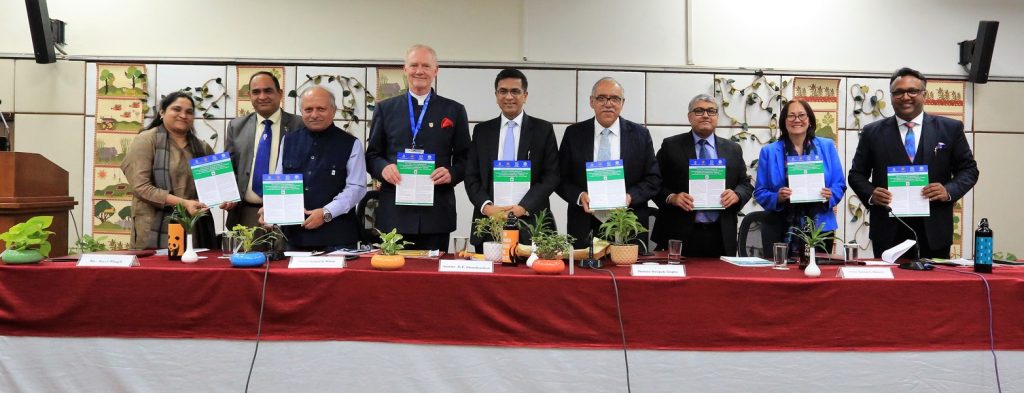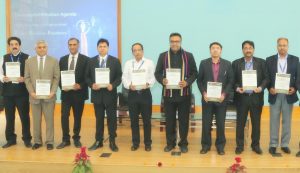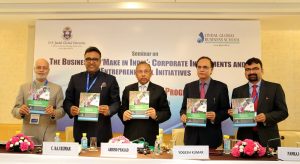
Jindal Global Law School (JGLS) of O.P. Jindal Global University (JGU), in association with WWF-India, has launched an unique Masters Programme in Environmental Law, Energy and Climate Change, a first of its kind to be taught in India.

The two premier institutions have together to launch a one year LLM programme in a niche and futuristic area relating to environmental justice and climate change, which are critical to our existence on the planet. A Memorandum of Understanding (MoU) to this effect was signed between the two institutions in New Delhi on 27th March.
The launch event was graced by two Judges from the Supreme Court of India, Dr. Justice D.Y. Chandrachud and Mr. Justice Deepak Gupta, besides two Judges from the Supreme Court of Hawaii, USA, Mr. Justice Michael D. Wilson and Ms. Justice Sabrina McKenna.
This course is open to Law graduates who would like to develop specialist legal knowledge on national and global environmental issues. The law professionals working in the field of environment will also be benefitted by this programme.

Explaining the important role of law makers in protecting the environment and the significance of the course, Professor (Dr.) C Raj Kumar, Founding Vice Chancellor, JGU said, “The theme of environmental law and climate change is probably the most important issue that universities and law schools should be concerned about. There is a sense of responsibility on the part of higher education institutions to be able to address issues that are going to have significant implications for the future. Environment is one such thing, but even more importantly, legal institutions and laws have a very significant role in speaking truth to power. Public policy and law have that goal and with that objective we are launching the Master of Laws programme in collaboration with WWF-India.”
The one year LLM course consists of core and elective courses covering national and international environmental laws, energy laws and policies, climate change governance and adaptation, renewable energy development in India and field trips for promoting experiential learning.
The objective of the programme is not only to study the relationship between environment and climate change as well as the role of law, judiciary, resolution mechanisms but the alternate energy solutions and how people are dealing with climate change, environmental laws and the implementation of available solutions.
Speaking about the course, Professor Dabiru Sridhar Patnaik, Chief Proctor, JGU, and Director, Centre for Post Graduate Legal Studies, Jindal Global Law School said, “The LLM programme will contribute to discussions on critical issues on environment and sustainability and build capacity of legal professionals so that they are well equipped to address the challenges and contribute to the field of conservation.”
In his address, Mr. Ravi Singh, Secretary General & Chief Executive Officer, WWF-India explained the role of law in creating a healthy and clean environment and thereby preventing the abrupt changes in climate. “The abrupt changes in climate these days are alarming. These changes and protection of environment come under the purview of law and policies. Aiming to create awareness about this and its implications, Green Law lecture was initiated in 1998 to promote environmental law. Now law institutions and global law schools are taking this ahead. The course launched today is a step towards it.”
Ms. Moulika Arabhi, Advisor, Centre for Environmental Law, WWF- India said, “Law and policies of the country need to be stringent to combat climate change and its adverse effects. Economic development, decentralized Government mechanisms and judicial interventions need to go hand in hand to deal with climate change issues and adaptation to them. Environment law courses and conferences like this provide the necessary understanding.”

Delivering the Green Law lecture on Environmental Justice and the Rule of Law: Role of the Judiciary and Judges, Dr. Justice D.Y. Chandrachud termed climate change as an existential threat and the most important issue facing humanity today. He elaborated on the various threats facing the environment like greenhouse gas emissions, and the marine debris floating in the Pacific Ocean and other Oceans.
He also spoke of the threat posed by water scarcity in India as well as across the world and the extinction of various species due to global warming and the marked increase in natural disasters due to deforestation and climate change that has resulted in environmental refugees.
Speaking about the role of judiciary in environmental justice, he said “the rule of law in environmental governance is seen as an aid in recognizing of environmental injustices faced by vulnerable groups such as indigenous tribes, women and livelihood reliant communities. It seeks to empower them. Ecological sustainability cannot exist without the rule of law.”
Looking inwards, Justice Chandrachud remarked “As judges and lawyers, we need to be more environmentally sensitive and ensure that the printing of paper is only done whenever it is necessary. There should be a national level policy for handing and disposing off files and documents for cases that have been disposed of. There is a need for the National Green Tribunal to really fan out to different parts of the country and not expect citizens to come to large metropolitan cities in need of justice.”
He also described how the Indian courts are trying to make judicial process more environment friendly by going digital and adopting sustainable means like solar panels, energy-efficient electrical fittings, rain water harvesting etc.
“In the larger scheme of things, small decisions and changes of habits in relation to what we eat, what we wear, how we travel and how we work can go a long way in assisting our transition into a sustainable society. It is time we see ourselves as ecological citizens.” remarked Justice Chandrachud.

In his Presidential address, Mr. Justice Deepak Gupta highlighted the need for equal access to environmental justice. He urged the civil society to be more aware and proactive in protecting the environment. “Court and judiciary can just pass orders. To reach the desired solution, administration and public will have to come forward and act as well. Otherwise, the country will keep moving from critical to extremely unhealthy environment leading to further damages and climatic changes. And for this one needs not only education, but sensitivity too.”

Mr. Justice Michael D. Wilson and Hon’ble Justice Sabrina McKenna, Judges of the Supreme Court of Hawaii, USA delivered the Special Addresses. They spoke of the harm caused to the environment and the need for urgent remedial steps. They contended that to save and protect the environment, not only the law but the entire human race has to come forward and act together and a programme like the LLM is the right step forward to train professionals and contribute to the rule of law.
The launch was attended by senior lawyers, policy makers, conservation and environment experts, academicians and students.
To know more about the course please click here


